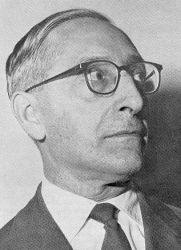Giuseppe Brotzu
Italian pharmacologist known for discovering cephalosporins
Giuseppe Brotzu[edit | edit source]
Giuseppe Brotzu (24 January 1895 – 8 April 1976) was an Italian pharmacologist and physician, renowned for his discovery of the cephalosporin class of antibiotics. His work significantly contributed to the field of medicine, particularly in the treatment of bacterial infections.
Early Life and Education[edit | edit source]
Giuseppe Brotzu was born in Cagliari, Sardinia, Italy. He pursued his medical studies at the University of Cagliari, where he developed a keen interest in microbiology and pharmacology.
Career[edit | edit source]
After completing his education, Brotzu began his career as a professor at the University of Cagliari. His research focused on the study of bacteria and their potential to produce substances that could inhibit the growth of other microorganisms.
Discovery of Cephalosporins[edit | edit source]
In the late 1940s, Brotzu discovered a new type of antibiotic while studying the waters off the coast of Sardinia. He isolated a strain of the fungus Cephalosporium acremonium (now known as Acremonium chrysogenum) that produced substances capable of killing gram-positive and gram-negative bacteria. This discovery led to the development of cephalosporins, a class of antibiotics that are widely used today.
Impact on Medicine[edit | edit source]
The discovery of cephalosporins had a profound impact on the treatment of bacterial infections. These antibiotics are effective against a broad range of bacteria and are often used in cases where patients are allergic to penicillin. Cephalosporins have become a critical tool in the fight against antibiotic resistance.
Later Life and Legacy[edit | edit source]
Brotzu continued his research and teaching until his retirement. He was widely recognized for his contributions to medicine and received numerous awards throughout his career. Giuseppe Brotzu passed away in 1976, leaving behind a legacy of innovation in the field of antibiotics.
Related pages[edit | edit source]
Search WikiMD
Ad.Tired of being Overweight? Try W8MD's NYC physician weight loss.
Semaglutide (Ozempic / Wegovy and Tirzepatide (Mounjaro / Zepbound) available. Call 718 946 5500.
Advertise on WikiMD
|
WikiMD's Wellness Encyclopedia |
| Let Food Be Thy Medicine Medicine Thy Food - Hippocrates |
Translate this page: - East Asian
中文,
日本,
한국어,
South Asian
हिन्दी,
தமிழ்,
తెలుగు,
Urdu,
ಕನ್ನಡ,
Southeast Asian
Indonesian,
Vietnamese,
Thai,
မြန်မာဘာသာ,
বাংলা
European
español,
Deutsch,
français,
Greek,
português do Brasil,
polski,
română,
русский,
Nederlands,
norsk,
svenska,
suomi,
Italian
Middle Eastern & African
عربى,
Turkish,
Persian,
Hebrew,
Afrikaans,
isiZulu,
Kiswahili,
Other
Bulgarian,
Hungarian,
Czech,
Swedish,
മലയാളം,
मराठी,
ਪੰਜਾਬੀ,
ગુજરાતી,
Portuguese,
Ukrainian
Medical Disclaimer: WikiMD is not a substitute for professional medical advice. The information on WikiMD is provided as an information resource only, may be incorrect, outdated or misleading, and is not to be used or relied on for any diagnostic or treatment purposes. Please consult your health care provider before making any healthcare decisions or for guidance about a specific medical condition. WikiMD expressly disclaims responsibility, and shall have no liability, for any damages, loss, injury, or liability whatsoever suffered as a result of your reliance on the information contained in this site. By visiting this site you agree to the foregoing terms and conditions, which may from time to time be changed or supplemented by WikiMD. If you do not agree to the foregoing terms and conditions, you should not enter or use this site. See full disclaimer.
Credits:Most images are courtesy of Wikimedia commons, and templates, categories Wikipedia, licensed under CC BY SA or similar.
Contributors: Prab R. Tumpati, MD

